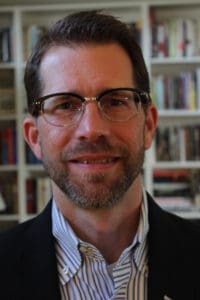25 Apr Whoever Can Heal the Soul will be the Priests of a Society

Jerry could barely get out of bed, but he couldn’t afford to miss another day of work – he had already missed too many. Somehow, he made it to the office and got through the day. That night, by himself in the dark, he began thinking of ways to kill himself. That’s when he knew he needed to find help.
Jerry had read about depression and figured that was what he was facing. He sat down his computer and searched for “psychologist,” “counseling,” “depression,” but he really didn’t know where to start. He called a few places, but they didn’t take his insurance.
The next day, he confided in his friend Bob. Bob mentioned that his pastor had recommended a Christian counselor when he had been feeling depressed a couple of years ago. Curious, Jerry asked Bob if the counseling helped. “I only went once,” Bob said. “I liked the counselor, but it was too expensive, and they didn’t take insurance.”
Feeling increasingly desperate Jerry contacted his local community services board. Because he did not make much money, he was able to qualify for a few free counseling sessions. He thought the sessions helped a little, but when they were over, he knew he was not out of the woods. But where should he turn now?
Jerry ran into Bob some time later. Bob asked how things were going. Jerry admitted, “I feel like I’m getting more desperate every day, but I have no idea what to do.” Bob didn’t know how to respond. He remembered being told in a personal evangelism class he had taken at church that people are often more open to God when they are going through a tough time, so Bob invited Jerry to church. Jerry was appreciative and replied, “Thanks – as soon I find someone who can help me get rid of my depression, I’d really like to try that.”
Most pastors, including me, cringe at hearing a story like this. We want to say, “Jerry – Jesus and the church have the answer to your depression!” And we mean it! As much as we don’t want to face it, however, this scenario is playing out all over the country. Perhaps Jerry wouldn’t have put it this way, but he was looking for a “priest” who could heal his soul – only, he was looking everywhere else but the church. The truth is, whoever can heal the soul will be the priests of a society, and this presents an urgent concern and opportunity for the Church.
Let me explain this a little more…
We see the studies showing the apparent decline of the American church. The number of people attending church is decreasing overall. The general value of the church is shrinking in the eyes of many. On the other hand, most people are painfully aware that our country is experiencing a serious mental health crisis.
Increasingly, our culture is looking to modern secular psychology for the solution to growing human discontent and associated dysfunction. Scholars and practitioners of secular psychology are aggressively maneuvering to solidify their role as the new clergy (i.e. “priests”) and faith communities of society.
Historically, the Church has had a rich tradition of “healing the soul” – what is today often called psychotherapy. Over the past couple of centuries, however, the Church has surrendered responsibility for “healing the soul” to the field of modern secular psychology. Simultaneously, modern secular psychology has done its best to push the Church out of this space in order to establish its dominance. This has led to a false dichotomy where the Church takes responsibility for liturgy, evangelism, and biblical literacy – and modern secular psychology takes responsibility for serious healing of the soul. Both the Church and modern secular psychology have been content with this arrangement.
Because of this history, most churches today are not prepared to help people that society categorizes as having some sort of mental health challenge. This is a shame because learning to engage this issue is a potential form of outreach for the local church. For the church to make a significant impact on the current mental health crisis, however, the church must simultaneously: 1) have more humility about what it is not currently prepared to do, and 2) have more confidence in what it is actually capable of doing with a little help.
I started New Day Help Center to help sincere churches restore this soul healing “priesthood” back to the church and increase its value in the eyes of American society by helping it engage the mental health crisis. At New Day, we do this by training churches to develop public facing counseling ministries they can use to reach out to the surrounding communities with free counseling. Part of this process involved training church members to engage in serious ministry to seriously hurting people.
The aim of this training is to equip church members to have the confidence to engage seriously wounded people in ways that are consistent with Scripture. There are no prerequisites to take our entry level “Encourager” training. This is 16 hours of class time and 10 logged ministry hours. We are beginning another round of Encourager training classes in early May.
To find out more about this training, check out our website (www.newdayhelp.org) and sign up for our newsletter. On the Events page, you can find details about the training and request further information. Also, please feel free to write me.

Dr. Scott Maurer
Dr. Scott Maurer is Executive Director of New Day Help Center, a Christian ministry that provides free counseling to hurting people and equips the church to do the same. He is an ordained pastor and spent 15 years in full time pastoral ministry – most of that time as a senior pastor. His passion is to see healthy churches welcoming broken people and healing them as the arms and feet of Jesus.


